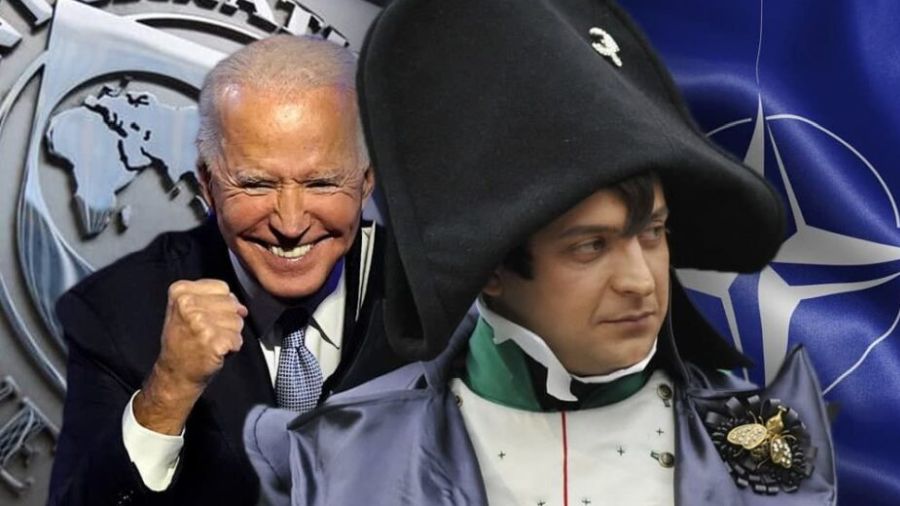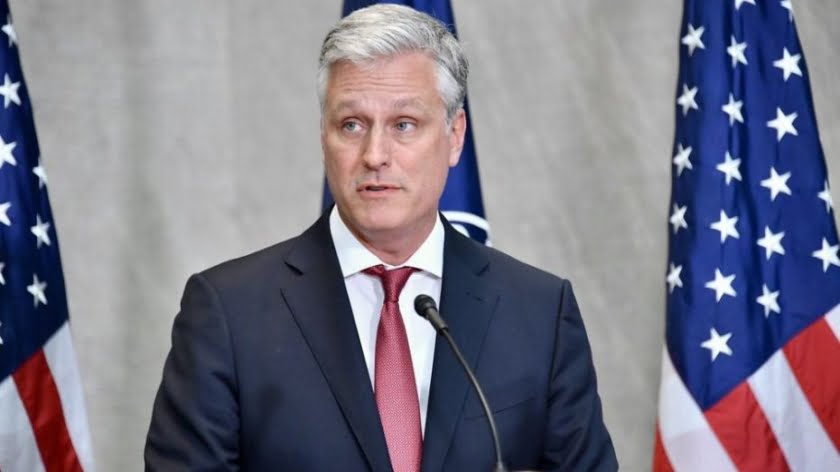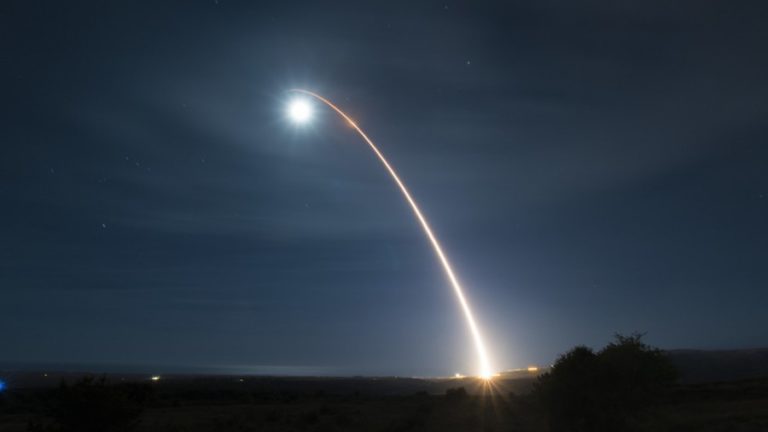Biden Is Turning Pages on Foreign Policy
The great danger is that Washington’s provocations will cross the “red line” with Moscow and lead to escalation, which will indeed be a page-turner.
When President Biden gave his speech on August 31 about the Afghanistan debacle he touched on future U.S. policies as regards the massive military leviathan which is deployed to over 750 bases in about 80 countries. He said the U.S. would no longer wield military power “to remake other countries” and “as we turn the page on the foreign policy that has guided our nation the last two decades, we’ve got to learn from our mistakes.” This declaration of policy was welcome — until he began to denounce the supposed enemies who would engage his less-divided attention from now on.
Never at a loss for a cliché, he declared “the world is changing” before making it clear that the military-industrial complex in the U.S. has not changed in the slightest and would continue to concentrate on what Biden says he regards as the most important international threats to “The Homeland” because “We’re engaged in a serious competition with China. We’re dealing with the challenges on multiple fronts with Russia.”
The day after he reiterated the Second Cold War posture concerning Russia and China, Biden met in the White House with President Volodymyr Zelensky of Ukraine whose call had been postponed because of the shambles and carnage in Kabul. The July White House briefing paper about the impending discussions had set the tone for Mr Biden’s page-flipping by asserting that “the visit will affirm the United States’ unwavering support for Ukraine’s sovereignty and territorial integrity in the face of Russia’s ongoing aggression”, and following the belated meeting the White House issued a Joint Statement declaring among other things that “the bonds between the United States and Ukraine are stronger than ever.”
The bond between the United States and Ukraine was never strong and indeed never existed until the U.S.-Nato military alliance decided to enlarge and advance closer to Russia’s borders, in spite of the U.S. having given assurances that the grouping would not expand “one inch eastward”. It then became imperative to cultivate and subsidise countries that presented an anti-Russia front, to the extent that the U.S. sponsored a coup in Ukraine in 2014.
As noted by the Cato Institute, “The extent of the Obama administration’s meddling in Ukraine’s politics was breathtaking. Russian intelligence intercepted and leaked to the international media a [Victoria] Nuland telephone call in which she [then U.S. Assistant Secretary of State for European and Eurasian Affairs] and U.S. ambassador to Ukraine Geoffrey Pyatt discussed in detail their preferences for specific personnel in a post‐Yanukovych government. The U.S.-favoured candidates included Arseniy Yatsenyuk, the man who became prime minister once [the then President] Yanukovych was ousted from power. During the telephone call, Nuland stated enthusiastically that “Yats is the guy” who would do the best job.”
It seems President Biden has forgotten — or more likely ignores — the rabidly anti-democratic manner in which regime-change took place in Ukraine because he declares “we stand shoulder-to-shoulder, optimistic about our ambitious common goals to advance democracy, deliver justice, enhance prosperity, and bolster security for Ukraine.” But the very fact that the egregious Nuland was appointed to be Biden’s Under Secretary of State for Political Affairs indicates that Ukraine can do no wrong, no matter how corrupt it is (right up there in the corruption index with Egypt and the Philippines, at 117 out of 179 countries).
In describing this strategic partner and valued ally of the United States the State Department records that “significant human rights issues included: unlawful or arbitrary killing; torture and cases of cruel, inhuman, or degrading treatment or punishment of detainees by law enforcement personnel; harsh and life-threatening conditions in prisons and detention centres; arbitrary arrest or detention; serious problems with the independence of the judiciary…”
None of these violations of human rights was mentioned during the cordial meeting between Presidents Biden and Zelensky in the White House. There was nothing but amiability in their exchanges which included the promise that Washington will continue to support “Ukraine’s efforts to use the Crimea Platform to focus international attention and action on the humanitarian and security costs of Russia’s occupation of Crimea with the aim of peacefully restoring Ukraine’s control over this territory in accordance with international law.”
Washington is determined to keep Crimea to the forefront of its international policy as a means of confronting Moscow — which will never relinquish the region which, with one small gap, has been part of Russia for centuries. There is no evidence of a Biden page-turn in this aspect of foreign relations and no acknowledgement, as I have written before, that “some 90% of the inhabitants of Crimea are Russian-speaking, Russian-cultured and Russian-educated, and it would be strange if they did not vote for accession to a country that welcomes their kinship, empathy and loyalty”. So a plebiscite was held, and it should be remembered that the Organization for Security and Cooperation in Europe was asked by the government of Crimea to send representatives to monitor the referendum but refused to do so.” What reason could there be for that?
The UK’s Guardian newspaper is one of the few western media outlets acknowledging that re-accession of Crimea to Russia “is a fait accompli that no one now expects to be reversed” but in this case it does not suit the Washington administration to accept that, in Biden’s own words, “the world is changing.”
In Biden’s world, one of the many things that isn’t changing is the profit reaped by weapons’ manufacturers that benefit so much from all confrontations and conflicts. In the case of Ukraine, the White House notes that “the United States has committed $2.5 billion in support of Ukraine’s forces since 2014, including more than $400 million this year alone”, which sits well with the policy of welcoming “Ukraine’s continued progress on defence and defence industry reforms, including the adoption of a new defence industry strategy.” It is part of the continuing programme of profit-making for the Pentagon’s arms’ suppliers.
Responsible Statecraft reports that “the top five Pentagon contractors enjoyed a boom in growth in federal contracts over the course of the war in Afghanistan. Stephen Semler, co-founder of the Security Policy Reform Institute, found that Congress gave $2.02 trillion [emphasis added] to the top five weapons companies — Raytheon, Lockheed Martin, General Dynamics, Boeing and Northrop Grumman — between 2001 and 2021. And between 2002 and 2020, federal funding for those five weapons companies grew by 188 percent.” Given that these and hundreds of other corporations contribute massive sums to legislators’ election campaigns, they will continue to receive energetic support from the House and Senate. With the ending of the lucrative war in Afghanistan, the weapons’ industry, the vital partner in the powerful military-industrial complex, welcomes Biden’s page-turning.
Ukraine is a minor country, riven with corruption and a proven violator of basic human rights, but to the Military-Industrial complex it is an important international player because it provides a rationale for confrontation with Russia. The weapon’s manufacturers, the Pentagon and the armed services are certainly on a new page, and the supposed “challenges on multiple fronts with Russia” will more than compensate for the lost profits of twenty years of futile sword-swinging in Afghanistan. The great danger is that Washington’s provocations will cross the “red line” with Moscow and lead to escalation, which will indeed be a page-turner.







